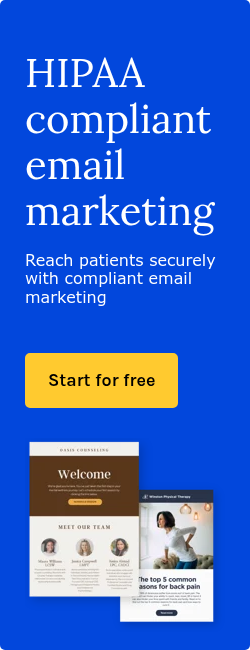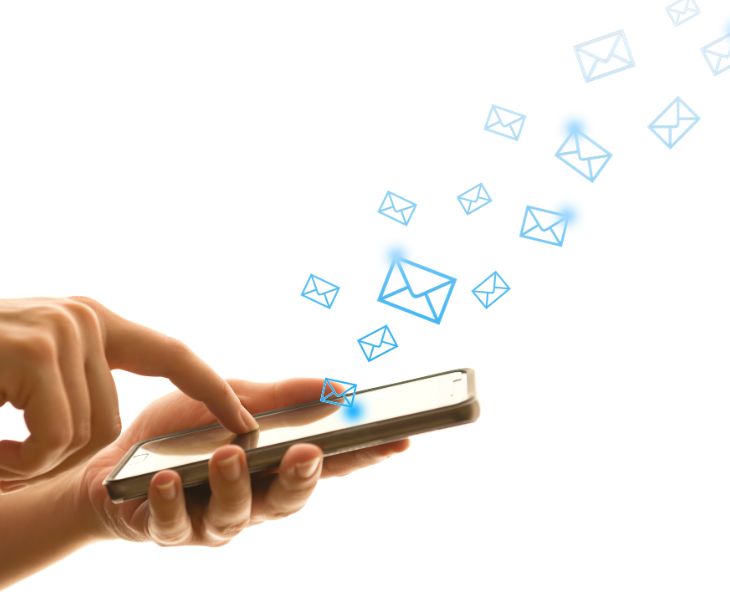
Therapists can use email marketing strategies to engage clients, build relationships, and improve overall practice outcomes. However, they must remain HIPAA compliant and address concerns related to protected health information(PHI).
The benefits of email marketing for therapists
HIPAA compliant email marketing allows therapists to communicate and engage with clients in a personalized and consistent way between sessions. They can share relevant information, resources, and updates, fostering a sense of connection and continuity in the therapeutic relationship.
Effective email marketing can potentially increase client retention and generate referrals. Regular communication via email keeps therapists at the forefront of their clients' minds, reinforcing the value of therapy and the therapist-client relationship. Satisfied clients are more likely to refer friends, family, or colleagues to their therapist, potentially extending the client base.
Email marketing in therapy practices
1. Establishing client relationships
Personalized and engaging content is key to building strong relationships with clients. Therapists should tailor emails to address clients' specific needs and concerns, ensuring the information provided is relevant and valuable. Welcome emails and onboarding sequences can be effective in introducing new clients to the therapy process and setting expectations.
Pro tip: Maintain a professional tone and always respect client privacy.
2. Educational content and resources
Sharing educational content through email is an excellent way to empower clients and enhance their progress. Provide informative articles, videos, or podcasts on relevant topics to assist clients in their journey toward wellness. Educational content educates clients and keeps them engaged and motivated throughout the therapeutic process.
3. Promotions, events, and special offers
Email marketing can be used to promote therapy packages, discounts, workshops, or events. Offering special incentives to clients encourages participation, helps attract new clients, and fosters a sense of community.
4. Appointment reminders and Follow-ups
Automated appointment reminders through email can significantly reduce no-show rates and improve overall scheduling efficiency. Following up with clients after sessions demonstrates care and commitment, providing an opportunity to address any concerns, offer additional resources, or reinforce progress made during therapy.
Optimal strategies for effective email marketing
To maximize the impact of email marketing, therapists should consider the following :
- Create engaging and compelling content: Use a conversational tone, include relevant visuals, and focus on delivering valuable information to clients.
- Segment and personalize emails: Tailor emails based on client demographics, interests, or therapeutic needs. Personalization increases the likelihood of clients engaging with the content.
- Consistent communication and scheduling: Maintain regular communication by establishing a consistent email schedule. This helps establish expectations and ensures clients receive relevant information without feeling overwhelmed.
- Track and analyze campaign performance: Use email marketing platforms that offer analytics to measure campaign performance. Monitor opens, click-through rates, and conversions to refine future email strategies.
Related: Email metrics for effective healthcare email marketing campaigns
Addressing concerns around PHI in email marketing
Here are some considerations to address concerns around PHI:
- Partnering with secure email services: Choose email marketing platforms that prioritize data security and HIPAA compliance. Look for providers that offer features such as encryption and secure data storage to protect PHI from unauthorized access.
- Minimizing PHI in email content: Avoid including unnecessary PHI in email content. While it's important to personalize communication, be mindful of including only the essential information to maintain client confidentiality.
- Educating clients about risks and security measures: Provide clear instructions on how to securely handle emails, such as advising them not to forward sensitive information or to use secure methods for responding to emails.
- Maintaining strong passwords and secure access: Protect your email accounts with strong, unique passwords and enable two-factor authentication for an added layer of security. Limit access to your email accounts and ensure only authorized personnel can access client information.
- Regularly updating security measures: Review and update your security protocols regularly to address emerging threats or vulnerabilities.
- Training staff on HIPAA compliance: Ensure that all staff members involved in email marketing are trained on HIPAA regulations and understand their responsibilities in maintaining the privacy and security of client information.
- Establishing clear policies and procedures: These guidelines should cover areas such as consent for email communication, handling of PHI, incident response plans, and staff responsibilities to ensure HIPAA compliance.
Related: HIPAA email marketing rules explained
HIPAA compliant email marketing empowers therapists to enhance their therapy practices and strengthen client relationships. By utilizing personalized and engaging content, therapists can establish meaningful connections, provide educational resources, and promote therapy services effectively. However, it is essential to adhere to HIPAA guidelines, address concerns related to PHI, and maintain client trust throughout the email marketing process.
Go deeper:
- How to build and send a HIPAA compliant newsletter in only 2 minutes
- Understanding opt-in and HIPAA compliant email marketing
Subscribe to Paubox Weekly
Every Friday we'll bring you the most important news from Paubox. Our aim is to make you smarter, faster.




